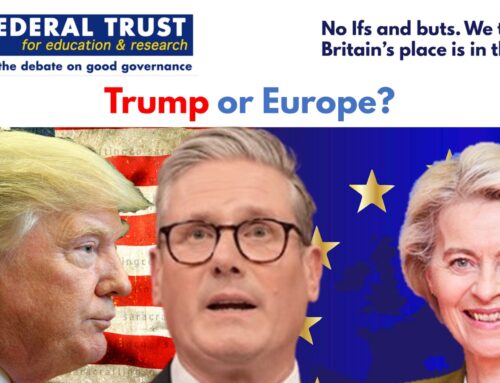Photo credit: European Union

by Dr Andrew Blick
Reader in Politics and Contemporary History at King’s College London; Senior Research Fellow at the Federal Trust
13th March 2020
At some point in the coming months, political discourse in UK will move on from its current focus on the single issue of the pandemic and its domestic implications. At that point we will see renewed interest in a recurring theme of the last four years: the cliff edge, after which the UK might find itself outside the EU with no trade agreement with this organisation in place. Following UK departure from the EU on 31 January, a transition period came into force. It facilitates the temporary avoidance of disruption, by continuing many aspects of membership. At present, this phase comes to an end on 31 December 2020. There is a possibility to extend it by either one or by two years. A decision to do so must be taken by July 2020. However, the UK government has clearly set itself against doing so; and domestic legislation dealing with the withdrawal agreement prevents the UK government from consenting to any such extension.
Commitments can be reneged upon, and laws can be repealed or worked around. Whether the will to do so exists – on the part of both the UK and the EU – is likely to be tested in the entirely plausible circumstances that, for political or practical reasons, an agreement cannot be reached in the available time (assuming it can be reached at all, or that both parties even want to reach it). Likely critical cut-off points are the end of June and the end of December this year.
We have seen many such supposed junctures come and go in the post-referendum period. It might be tempting for the public, commentators and politicians to conclude that some way through will be found and the cliff edge avoided. They might believe or hope that negotiators on both sides will manage to reconcile the basic needs of the EU with the political imperatives of the UK, preventing a severe rupture in the trading relationship between the two. By the time transition arrangements cease (on the current timetable) at the end of 2020, the Brexit episode will have continued for longer than the First World War. Fatigue is understandable. However, problems cannot be wished away.
An abrupt de-linkage between the EU and UK, that is, the expiration of the transition period without a comprehensive Free Trade Agreement (FTA) in its place, will be damaging to both parties, but surely more so to the UK. For this reason, the EU is in a stronger bargaining position than the UK. Whatever disruption to the global economy is about to take place, it is not plausible that it could change this basic dynamic. Therefore, if the UK wants a meaningful FTA with the EU, it must concede certain principles: the need to maintain a level playing field, enforced in a way that meets EU requirements. Failure to do so would entail allowing UK trading access to the EU in a way that compromised the European single market. The EU is politically and legally unable to agree a deal that lets the UK ‘have its cake and eat it’. To concede such an arrangement would threaten its very viability as an organisation.
If the UK wishes to avoid ‘no deal’, logic might suggest that it will recognise this reality, accepting it as a shared assumption upon which negotiations can proceed. In such a scenario, the EU may be willing to make concessions, providing the UK with flexibility in various areas, but subject to the understanding that the UK will continue to remain in alignment with European law where required. But at this point logic comes into conflict with political imperative.
The Brexit platform has never been entirely coherent. Vagueness has suited the requirements of its spokespeople; and the Eurosceptic movement has always been diffuse in nature, incorporating adherents from across the political spectrum whose motivations are difficult to reconcile. But a recurring theme in advocacy of UK departure from the EU has been an assertion that the UK will indeed be able to have its cake and eat it: diverging from European regulations in ways that suited the commercial interests of the UK, while retaining the benefits of membership. Leading exponents of this general case have included the present Prime Minister. When making this claim they have drawn attention to the importance of a post-Brexit UK as an EU export market. They have suggested that governments of individual member states will be subject to lobbying from domestic commercial interests that will force them to reach an accommodation that suits the UK; and that they may even break ranks and negotiate directly with the UK, rather than working jointly through the EU.
There are various difficulties with this scenario. But the most important practical problem is that, so far, it has not come to pass. The EU has maintained a united front; and evidence of powerful internal pressure on governments to compromise is lacking. For governments and many commercial interests in the EU, being able export to (and import from) the UK is important – but protecting the existence of the Single Market is more so.
When confronted with the possibility that having cake and eating it will not be available as an option, how have proponents of Brexit responded? They have tended to hold that, rather than signing up to a deal that recognises the need to adhere to the level playing field in return for ease of access, it would be better not to agree any deal at all. Sometimes, supporters of departure from the EU even claim that leaving without a deal might be a positive outcome – calling into question the proposition that the UK should be seeking an FTA at all. Adding to the contradictions, they sometimes suggest that the possibility of no deal should be used as a threat – that, as long as the UK can convince the EU that it is serious about allowing this outcome to come about, it will be able to force the EU to accept its terms. According to this argument, the UK will be able to avoid the undesirable advent of no deal by convincing itself and others that it is willing to countenance it. These various propositions are difficult to reconcile, even though they might emerge from the same sources, and suggest a platform founded in rhetorical necessity rather than the assessment of material reality.
The real choices facing the UK, then, are to sign up to a deal that fits with the broad requirements of the EU, or none at all. Both options present problems to the UK government. An FTA will not deliver on the promise of having cake and eating it. Failure to secure a deal at all will also imply a negotiating failure, from the point of view of the claim that no deal was a threat intended to force the EU into making concessions. The economic damage that no-deal is likely to inflict would also contradict claims that it is a genuine opportunity to be embraced.
So far the UK has avoided overtly making this choice. As the cut-off point in the middle of 2020 looms, what approach will it take to this unwelcome though self-inflicted dilemma? One course of action could be to delay – to seek an extension to the transition period. There are various difficulties with this approach. Though it might help address the practical challenges involved in devising a major FTA in such a short space of time, it will not alter the fact that the EU is the stronger party in negotiations, and that the UK needs to accept its priorities if it wants ultimately to avoid a cliff edge. Furthermore, as discussed above, the Johnson government has committed itself to not extending the process, and even to breaking off talks in June if it judges that it will be unable to secure a satisfactory outcome by the end of the year.
Another means of avoiding open acceptance of the flaws in the Brexit prospectus would be to find ways of elongating the transition process by other means – creating similar arrangements with different names, for instance. The Johnson government might consider, rightly or wrongly, such a manoeuvre to be politically saleable, and preferable to other options. It would, of course, require cooperation from the EU and its member states, which may or may not be willing to help in this way, depending on an assessment of their own interests. Once again, however, assuming such a disguised extension were time-limited in nature, it would not resolve the longer term issues arising from UK reluctance to face up to its strength relative to that of the EU. Moreover, some recent evidence – for instance, the decision to withdraw from the European Arrest Warrant system – suggest that the UK is committed to maximising discontinuity.
At any time, such a manifestly irrational approach is vulnerable to the charge of irresponsibility. In the current position of a likely impending global economic downturn and other forms of insecurity, such criticisms can only gain in force. Those who oppose Brexit may, for various reasons, feel reluctant to continue to voice their opinions on this matter so soon after departure, or to be seen to be exploiting a health emergency for their own ends. But present difficulties simply serve to reveal the inherently damaging nature of Brexit. Those who recognise this reality have a duty to draw attention to it, and seek a change of course.





